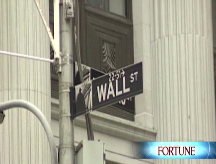The bailout: What's at stake
Americans don't need to worry about another depression. But no matter what happens with the bank bailout, the economy is unlikely to turn around soon.
NEW YORK (CNNMoney.com) -- First, the good news: Even if warnings of economic catastrophe aren't enough to win approval of a controversial $700 billion Wall Street bailout, the economy is not at risk of falling into a depression, most experts agree.
During the Great Depression, unemployment shot up to as much as 25% in 1933. That came after the gross domestic product, the broadest measure of economic activity, plunged 13% the previous year.
Millions of people lost their savings when banks closed without any insurance for its customers' deposits. Few economists are predicting economic pain of that magnitude.
Now the bad news: Even if the plan to buy up bad mortgage debt from troubled banks and Wall Street firm does pass, it probably won't be enough to stop the economy from getting worse than it is today.
And if the battered credit markets fail to restart, either because the bailout fails to win Congressional approval or it doesn't work as planned, the nation could be facing its worst economic downturn since the Great Depression.
The current crisis caused credit markets to seize up earlier this month, almost like a car engine running without oil. And as the debate over the rescue plan's details raged, hours of negotiations among key lawmkers broke down late Thursday.
How we got here. Banks and Wall Street firms, worried about both their own needs for cash and the condition of other institutions, essentially stopped loaning money to one another. That choked off the money being made available on Main Street in the form of mortgage loans, business loans and other consumer borrowing.
Federal Reserve Chairman Ben Bernanke spelled out the implications of this credit crisis earlier this week in front of Congress.
He talked of how small businesses would not be able to get the credit they need to operate, grow and hire workers. Consumers would have trouble getting mortgages to buy homes, further driving down prices. And tighter credit would mean lower sales of cars and other big ticket items, leading to more plant closings and layoffs.
"Credit is the mother's milk of the modern economy. The tighter the credit spigot closes, the worse the economy is going to be," said Mark Zandi, chief economist of Moody's Economy.com. "Businesses operate on credit. If they can't raise money, then very soon they won't be making payroll."
Economic pushback. Economists say that without a restoration of credit, unemployment would likely shoot up to over 10% from 6.1% today. And GDP could fall at an annual rate of between 2% and 4%.
Those unemployment and GDP readings would be the worst in more than 25 years. And many believe it would not be until at least 2010 before the economy starts to recover, which would make the current downturn the longest since the Great Depression.
But other experts say that credit was already tight before this month's Wall Street meltdown and that pumping $700 billion into the banking system isn't going to necessarily spur the economy.
Where does it end? Lakshman Achuthan, managing director of the Economic Cycle Research Institute, said the banks and Wall Street firms that will be the main beneficiaries of the bailout are going to take the money and prepare to deal with growing defaults in Europe and Asia as those economies slow.
He added that smaller banks will be more likely to repair their battered balance sheets than lend more aggressively.
Others point out that the bailout doesn't address the root cause of the problems on Wall Street as well as the broader economy: falling house prices.
That's why the Wall Street bailout won't be the last one pitched to Congress and taxpayers.
Jerry Howard, CEO of the National Association of Home Builders, said the Wall Street bailout is crucial, even though he doesn't believe it will solve the credit crunch that was hitting his members before the crisis started.
For this reason, Howard said as soon as Congress returns to work from its upcoming recess, his trade group will be asking for another package of between $40 billion and $90 billion directed towards the housing market.
And even if the bailout package is passed and banks start lending again, the events of the past few weeks could batter already "abysmal" consumer confidence, said Keith Hembre, chief economist with First American Funds.
Hembre said worries about the economy, falling home and stock prices and the weakening job market will lead consumers to pull back on spending over the next few quarters. If that happens, it would likely cause cutbacks in business and government spending as well.
"I have to believe that the economic activity gets worse before it gets better," he said. ![]()


